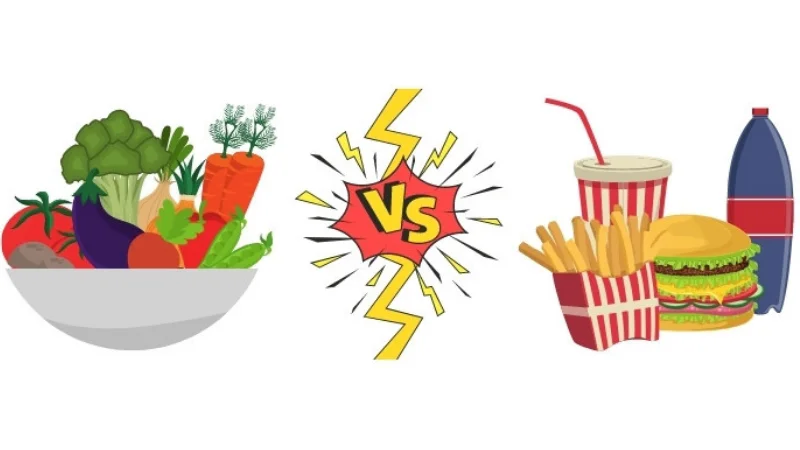Organic VS Fast Food is a discussion that has been around for a while. We’re going to take a look at what organic food is and how it compares to fast food.
Is Organic Food really better? Which is better, fast food or organic food? What are the pros and cons of organic foods versus the pros and cons of fast foods? Let’s go over them all!
Organic is often regarded as healthier for you than conventional, but there are reasons why people might still want to eat conventional too. Organic usually costs more than conventional.
In case you’re not up to date with the food news, fast food restaurants are primarily made of processed and packaged foods, high in refined carbohydrates and saturated fat. Fast food companies use a range of tactics to trick consumers into thinking their meals are healthy.
The majority of the world’s governments have set the bar for what healthy food consists of, leading us to believe fast food is unhealthy. However, research shows that it may actually be your diet that’s making you overweight and unhealthy.
There is an ongoing debate about whether you should eat organic or fast food. However, many people believe that organic foods are better for your health.
Studies have shown that people who eat organic food are less likely to get food-borne illnesses and chronic diseases, including diabetes and cancer. So, is it really worth the extra money? Let’s take a closer look at the difference between organic and fast foods.

Is Organic Food Really Better?
Before we begin, it’s important to understand what “organic” actually means. For a food to be considered organic, it must be grown without the use of pesticides; fertilizers made with synthetic ingredients or sewage sludge, bioengineering, or ionizing radiation.
Organic meat, fish, and produce may be higher in some nutrients — such as vitamin E, omega-3 fatty acids, and antioxidants — but the nutrient levels are key to health. Organic foods are far from healthier than non-organic foods.
A recent study conducted by researchers at Stanford University Medical Center in California tested 300 pairs of organic and conventionally grown wheat, corn, soybeans, milk, and eggs.
After examining the levels of nutrients such as protein, fat, and fiber, the researchers found that there was no significant difference between the two groups.
The Food Standards Agency (FSA) in the UK published a report that studied the nutrient content of organic and conventionally grown produce. Out of nearly 50 foods tested, they concluded that there was no consistent evidence of widely different nutrient levels between organic and non-organic food.
These studies prove that those who think organic food is healthier than conventional food are wrong. However, many people argue otherwise by claiming it tastes better.
It’s true that organically grown food can be much more flavorful. However, there’s no evidence to support the idea that organic foods are better for you.
Which Is Better Organic VS Fast Food?
Fast food is a pretty big part of our lives in America. According to the National Restaurant Association, Americans spend more on fast food than they do on groceries, and restaurants put out more than 1 billion take-out menus every single day.
The fast food industry profits from healthy eating habits, and most of the time, it’s used as an excuse for unhealthy nutrition. Fast food companies use all kinds of tactics to trick consumers into thinking their meals are healthy.
America’s obesity problem is largely attributed to fast food. In fact, about half of the meals consumed away from home are from fast-food restaurants.
While organic food has its own set of drawbacks, it is no doubt better than a typical fast-food menu. Fast food meals are high in saturated fat, cholesterol, and sugar. These factors increase the risk of heart disease and diabetes — two health conditions that have continually risen over the years.
Because they’re so easy to prepare and serve quickly, a lot of people rely on fast food as their primary source of nutrition. This can be extremely unhealthy.
Organic foods are free from pesticides, chemicals, and other additives because they’re grown in soil that has been fertilized naturally. Organic food is healthier for you because it’s not contaminated with unwanted substances that can be damaging to your health.
What Are The Pros And Cons Of Organic Foods?
Pros:
- Organic foods are free from toxins, chemicals, and additives.
- Nutrients in organic foods are higher than conventionally-grown food.
- Many organic food ingredients are produced locally.
Cons:
- More expensive than non-organic foods.
- Not all organic foods are available everywhere.
- Not ideal for people who are in a hurry.
- What Are The Pros And Cons Of Fast Foods?
What Are The Pros And Cons Of Fast Foods?
Pros:
- More convenient, faster, and easier than cooking at home.
- Quick and easy to make for busy people.
- It can bring joy to your taste buds.
Cons:
- High in saturated fat, cholesterol, and sugar.
- Saturated fats are linked to weight gain, heart disease, and diabetes risk.
- High in salt.
- Many vegetarian and vegan options are not available.
The Bottom Line
Both fast food and organic foods have their own set of pros and cons. However, I prefer to go with organic foods because they’re free from contaminants that can be potentially harmful to your health.
While fast food may taste amazing, it is high in fat, cholesterol, and sugar — all things that you shouldn’t consume if you want to live a healthier lifestyle.
Organic foods do cost more than non-organic foods, but they’re worth the price if you consider the health benefits they provide. If you’d like to find out more about what types of food options are good for you, check out this article.
Good luck, and don’t forget to share your thoughts on this topic in the comment section below!
- Chocolate Chip Cookie Recipe Without Chocolate Chips? Yes! - March 9, 2025
- Chili’s Blackberry Margarita Recipe – Make It At Home! - March 3, 2025
- Classic Marble Cake Recipe – Perfect Swirls Every Time - February 25, 2025


